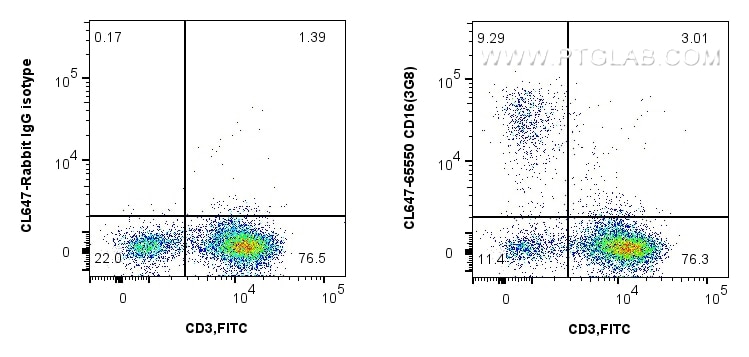Validation Data Gallery
Tested Applications
| Positive FC detected in | human PBMCs |
Recommended dilution
| Application | Dilution |
|---|---|
| This reagent has been pre-titrated and tested for flow cytometric analysis. The suggested use of this reagent is 5 µl per 10^6 cells in a 100 µl suspension or 5 µl per 100 µl of whole blood. | |
| Sample-dependent, Check data in validation data gallery. | |
Product Information
CL647-65550 targets CD16 in FC applications and shows reactivity with human samples.
| Tested Reactivity | human |
| Host / Isotype | Rabbit / IgG |
| Class | Recombinant |
| Type | Antibody |
| Immunogen | N/A 相同性解析による交差性が予測される生物種 |
| Full Name | Fc fragment of IgG, low affinity IIIa, receptor (CD16a) |
| Calculated molecular weight | 254 aa, 29 kDa |
| GenBank accession number | BC017865 |
| Gene Symbol | CD16a |
| Gene ID (NCBI) | 2214 |
| ENSEMBL Gene ID | ENSG00000203747 |
| RRID | AB_3673607 |
| Conjugate | CoraLite® Plus 647 Fluorescent Dye |
| Excitation/Emission maxima wavelengths | 654 nm / 674 nm |
| Form | Liquid |
| Purification Method | Affinity purification |
| Storage Buffer | PBS with 0.09% sodium azide and 0.5% BSA , pH 7.3 |
| Storage Conditions | Store at 2-8°C. Avoid exposure to light. Stable for one year after shipment. |
Background Information
CD16 is a 50-70-kDa low affinity Fc receptor found on the surface of natural killer cells, neutrophil polymorphonuclear leukocytes, monocytes and macrophages. CD16 mediates antibody-dependent cellular cytotoxicity (ADCC) and other antibody-dependent responses, such as phagocytosis. CD16 has been identified as Fc receptors FcγRIIIa (CD16a) and FcγRIIIb (CD16b), encoded by two nearly identical genes, FCGR3A and FCGR3B.
Protocols
| Product Specific Protocols | |
|---|---|
| FC protocol for CL Plus 647 CD16 antibody CL647-65550 | Download protocol |
| Standard Protocols | |
|---|---|
| Click here to view our Standard Protocols |
